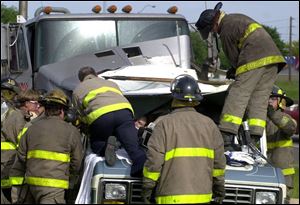
Insurers may face crash-response fee
10/12/2004
Toledo firefighter services such as extrication and first aid would be billed to the insurance companies of motorists in an accident. The plan is intended to reduce the city's deficit.
The city of Toledo, seeking new sources of cash to fill a general fund shortfall, is considering billing auto insurance companies for the cost of sending fire crews to motor vehicle accidents.
Under a plan suggested by Fire Chief Michael Bell, the city would bill for services like extricating trapped occupants, containing spilled fuel, providing first aid, and isolating downed power lines. He said the cost would be billed to the person determined by police to be at fault in the accident.
Chief Bell said the charge would ensure that nonresidents share the cost of Toledo's firefighting operation. About 40 percent of accidents responded to by city firefighters involve nonresidents, largely because of Toledo's location along the Ohio-Michigan border and the fact that I-75 and I-280 pass through the city. Not known is how many of those nonresidents pay the city's 2.25-percent income tax because they work in Toledo.
The proposed fee is an approach opposed by the insurance industry, but which Toledo officials said is already in use in more than a dozen Ohio cities - including Lima and Van Wert in northwest Ohio.
Cincinnati recently began billing insurance companies for accident services. The city has a contract with HealthServe, LLC, of Dayton to administer the billing, for a fee of 5.9 percent.
If the plan works the way it does in Cincinnati, insurance companies of motorists in Toledo accidents could be charged $603 for a typical response. No exact prices for services have been established.
Toledo could reap $100,000 to $200,000 annually in additional revenue for its general fund to help stave off deficits.
Chief Bell said the proposal to charge for fire department response to accidents is in response to requests to city directors from the mayor and council to come up with new revenue sources.
The general fund is facing a potential $14 million deficit in 2005, raising threats of layoffs
among police and firefighters and cutbacks in trash collection.
"We're trying to come up with creative ways to try to enhance the budget with some of the services we have now," Chief Bell said. "Whether we do it or not is really based on the political leaders."